|

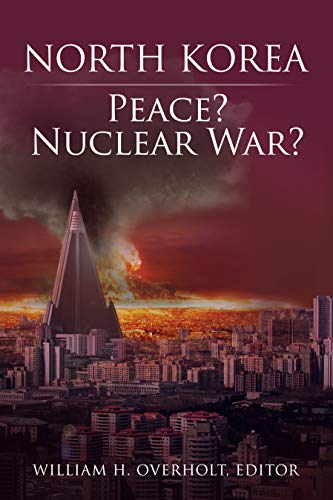 |
North Korea: Peace? Nuclear War?
2019
The North Korean nuclear crisis presents the contemporary world's greatest risk, not just of major war but most importantly of nuclear war. Despite its importance the crisis is being managed in a treacherous context of public ignorance and misinformation.
Publisher: Harvard University's Mossavar-Rahmani Center for Business & Government
Publication Date: 2019
PURCHASE ON AMAZON.COM |
 |
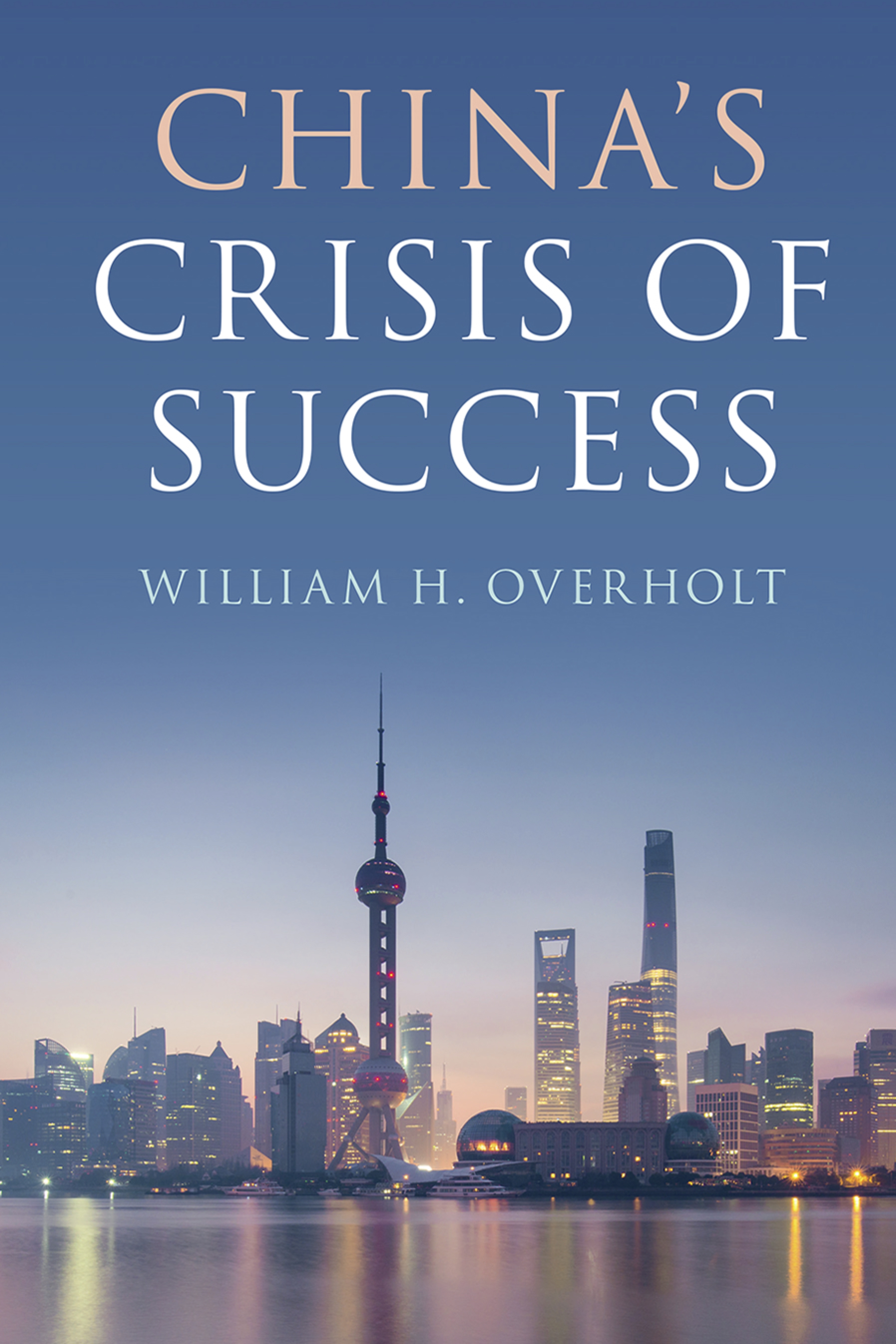 |
China's Crisis of Success
2018
China's Crisis of Success re-examines China's rise to superpower status, showing that, despite social and administrative strengths often unacknowledged by Western commentary, continued success now requires re-invention of its economy and politics. Xi Jinping's extremely risky strategy for re-invention could lead to success, stagnation or a great crisis.
Publisher: Cambridge University Press
Publication Date: 2018
PURCHASE ON AMAZON.COM |
 |
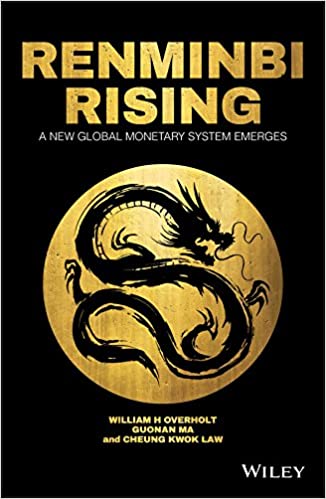 |
Renminbi Rising
2015
Renminbi Rising offers an analysis of the drivers, tracks the progress and reviews the most likely trajectory of China's internationalizing renminbi (RMB). This important resource also offers an examination of what the birth of the RMB era potentially means for the global financial system, international business and supporting financial products and services.
Publisher: Wiley
Publication Date: 2015
PURCHASE ON AMAZON.COM |
 |
 |
Asia, America, and the Transformation of Geopolitics
2008
American security and prosperity now depend on Asia. William H. Overholt offers an iconoclastic analysis of developments in each major Asian country, Asian international relations, and U.S. foreign policy. Drawing on decades of political and business experience, he argues that obsolete Cold War attitudes tie the U.S. increasingly to an otherwise isolated Japan and obscure the reality that a U.S.-Chinese bicondominium now manages most Asian issues. Military priorities risk polarizing the region unnecessarily, weaken the economic relationships that engendered American preeminence, and ironically enhance Chinese influence. As a result, despite its Cold War victory, U.S. influence in Asia is declining. Overholt disputes the argument that democracy promotion will lead to superior development and peace, and forecasts a new era in which Asian geopolitics could take a drastically different shape. Covering Japan, China, Russia, Central Asia, India, Pakistan, Korea, and South-East Asia, Overholt offers invaluable insights for scholars, policymakers, business people, and general readers.
Publisher: Cambridge University Press
Publication Date: 2007
PURCHASE ON AMAZON.COM |
 |
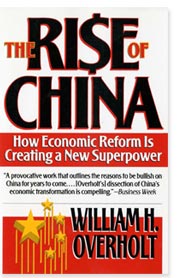 |
The Rise of China: How Economic Reform is Creating a New Superpower
1993
In the late 1980s and early 1990s most Americans, including President George H.W. Bush and the CIA, believed that China would collapse and Gorbachev would do great things for the Soviet Union. Throughout the period, Overholt argued that China's reforms would make it a great power again and that the Soviet Union would collapse (an argument Overholt first made in 1976). The Rise of China was the first book to argue the case for China's huge success. The reviews mostly said that Overholt's views of China's coming success were absurd. After China's success became a fact, dozens of books have taken up the theme, mostly missing the central points: China emulated successful policies from neighbors like South Korea and Taiwan, so success was predictable. It also faces transitions that those countries had to make, and its continued success depends on successfully making similar transitions.
Publisher: W. W. Norton & Company
Publication Date: 1994
This book won the Mainichi News/Asian Affairs Research Center Seventh Annual Special Book Prize for contributions to understanding of Pacific Asian Nations. Awarded November 9, 1995
In the Soviet Union and Eastern Europe, communism fell with a bang and the economies were opened with a "big bang." But the economies of these countries stagnated and their reentry into the world economy proceeded at a snail's pace. In China, the Communist Party did not fall at all, the economy has been remade not with a "big bang" but step by step. But its economy grew like wildfire and it has been reintegrated into the world economy with a bang. William Overholt offers an explanation for this paradox…One hopes that many leaders around the world will ponder the significance of the facts… In particular, the Clinton administration needs to work with China, Japan, and their neighbors to avoid an arms race and lay the foundations for a regional order that links the region to the world economy and provides Asia a place of honor in the rapidly changing global political structure.
- from the Introduction by Ezra F. Vogel, Harvard University
The next giant on the world scene will be China---and Overholt's incisive and provocative analysis will help to cope with its challenge.
-Zbigniew Brzezinski Center for Strategic and International Studies
PURCHASE ON AMAZON.COM |
 |
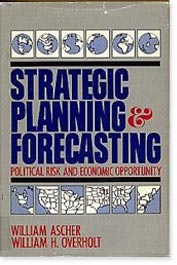 |
Strategic Planning and Forecasting: Political Risk and Economic Opportunity
"This is the first systematic treatment of forecasting and risk assessment that recognizes the role of political forecasting as part of the complex process of strategic planning. This is also the most detailed treatment of how to make forecasting effective in the planning process. Analysis of these central issues yields practical---often controversial---insights on organizing the forecasting effort, selecting appropriate methods, integrating non-political socio-economic projections, and presenting the results. Strategic Planning and Forecasting evaluates alternative methods of political forecasting, based on case studies and performance appraisals of methods ranging from journalistic speculation to complex modeling. The recommended approach of scenario-writing guided by analysis of political and economic dynamics is supported by illustrative case studies of Korea and Mexico, and by theoretic examinations or revolution, organizational strength, and economic policymaking. This unique and powerful theoretical perspective puts this book squarely in opposition to the current overemphasis on quantitative forecasting approaches. The book's recommendations on the format and presentation of political forecasts are based on the politics and psychology of the forecaster-policymaker relationship. The tradeoffs involved in the use of conditional forecasts, quantitative probabilities, and various approaches to organizing the forecasting effort are reviewed in light of the objective of making the political forecast an effective roadmap for the policymaker's own continuing effort to plan for the future."
Publisher: John Wiley & Sons Inc
Publication Date: 1983 |
 |
 |
Political Risk
Publisher: Euromoney Publications
Publication Date: 1982
This was the first book to offer a systematic approach to the analysis of political risk, at the time when the author's political risk group at Bankers Trust was rated as the leading group of its kind. Most of the competing approaches were very narrow (a bad Gini index of inequality implies a coming revolution—a simplistic theory that addresses only one of dozens of political issues for business) or based on very unsophisticated quantitative modeling that reflected the political science of the time (lots of numbers, no sound theory, minimal connection with economics). The book was written in great haste to meet a Euromoney deadline, and much of the substantive material is obsolete, but the framework has continuing value. Overholt drew on the material in subsequent years to teach in the U.S. Foreign Service Institute's Advanced Political Analysis course for foreign service officers being promoted to senior levels.
|
 |
 |
The Future of Brazil
Publisher: Westview Press
Publication Date: 1978
In the mid-1970s Overholt did a three-volume study of Brazil'a business environment for MacMillan Bloedel, a Canadian pulp and paper company contemplating a $2 billion joint venture with Brascan of Brazil. As a result of the study, the joint venture plan was canceled. Because the study's results were potentially valuable for many industries, MacMillan Bloedel and Hudson Institute approved the sale to other companies of a single-volume condensation for US$2500.00 and the sale was successful beyond the dreams of both companies. Later, some of the academic contributions to the conference that initiated the study were collected, along with Overholt's study conclusions into this book. Key academic contributors objected to Overholt's conclusion that the increasing complexity of Brazil's economy and politics would soon force major structural changes in both, but events bore out Overholt's conclusion. The discovery that a political risk study for a company could earn significant amounts of money inspired the emergence of a number of political risk groups. The field of political risk became a fad by the late 1970s and then faded in the early 1980s because the academic models of political risk underlying most of the firms had little applicability to the real world. |
 |
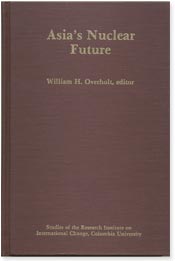 |
Asia's Nuclear Future
Publisher: Westview Press
Publication Date: 1977
This was the first book to be published about nuclear proliferation and nuclear strategies in Asia, a compilation of the views of leading experts. The book is the tip of an iceberg of government-funded studies to facilitate management of the aftermath of India's 1974 nuclear explosion and to intervene decisively against nuclear weapon development programs in South Korea and Taiwan. Overholt's conclusion that there was no military value, and great military risk, to stationing U.S. nuclear weapons in South Korea became widely accepted among experts and periodically affected policy. (The subject is a political football, sometimes unaffected by actual strategic calculations.) Lewis Dunn, who co-authored the introductory methodology chapter, later became the senior official in charge of nuclear proliferation issues at the U.S. Arms Control and Disarmament Agency. The expert analyses provide a stark and amusing contradiction between the Indian expert, who argues that his impoverished country (far more impoverished then than now) could afford to develop and deploy nuclear weaponry and would find it useful, whereas the Japan expert argued that wealthy Japan (then widely seen as likely to achieve global economic superiority and political leadership) could not afford them and would not find them useful. |
| |
|
| |
|
|


